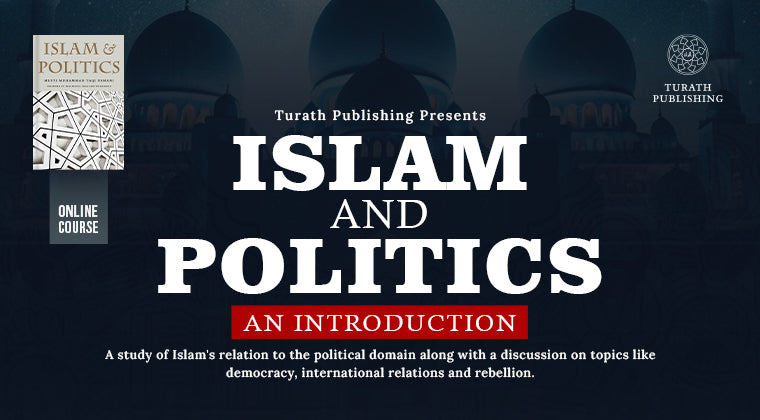-
1. Introduction and overview of the book
Shaykh Mufti Muhammad Taqi Usmani SahibThis will be Ml Asim Ayub hosting Mufti Taqi Sahib as he gives a brief overview and outline of the main points of the book. This session will look at the role of politics in Islam and also how its conception differs from modern and pre-modern Western understandings of power and politics. There will be a lecture followed by Q&A.
-
2. How to form a Government
Ml Asim Ayub and Ml Dr Zeeshan ChaudhriThis will be a session looking at the appointment of the Caliph from a classical Fiqh perspective and also in the modern context. Democracy and its legality will be looked at from the Islamic perspective, whilst there will also be discussion on the conditions required for a Caliph to be legitimate. The pragmatic concerns of the Shariah will also be laid out.
-
3. The principles of running Government
Shaykh Dr Salman YounasOnce an Islamic government has been formed, how does it actually function? This section will look at the power of the Ulema in an Islamic governance, along with whether women and non-Muslims can participate in law-making. There will also be look at decentralisation, freedom of speech and obedience to the ruler.

Islam and Politics - An Introduction
Detailed Description
Course Structure
-
4. Defence and Foreign Affairs
Shaykh Dr Sohail HanifThis session will study international law or siyar in the Islamic tradition. Jihad will be discussed in a contextual and objective way, along with diplomatic relations, and the nature of states and the rules pertaining to them – Dar al-Islam and Dar al-Kufr. There will also be discussion on non-Muslim minorities.
-
5. Ousting the Government
Shaykh Dr Salman Younas and Ml Asim AyubThis will be a follow-up to the discussion on obedience to the ruler from lecture 3. We will look at the idea of rebellion throughout Islamic history and the response by the Ulema in each case. The Hanafi view will be discussed in some details along with Imam Abu Hanifah’s own views on rebellion. There will also be a discussion on political movements and internal reform.
-
6. Moral Politics and Economics
Ml Asim Ayub & Imam Tom FacchineThis penultimate session will look at Islamic politics from the moral lens of the Prophet ﷺ. There will also be a comparison to the Western systems of politics and economics, focussing on the amoral nature of Western economics and politics, showcasing the Islamic solution to the crises at hand.
-
7. The Caliphate Today
Dr Ovamir AnjumWhat are the overarching principles of Islamic governance and how has that governance shifted practically over the last 1400 years, and what would a Caliphate look like today? Also, what are the ideas and concepts antithetical to the notion of Islamic governance?
Course Instructors
Mufti Taqi Usmani
Muftī Taqī ʿUsmānī is one of the most highly respected and influential scholars of Islam in the world today. The author of 143 books on various topics relating to Islam, he has contributed considerably to multiple fields of Islamic research, from Hadith studies all the way to Islamic finance. He currently serves as the Chairman of Wifaq ul Madaris Al-Arabia, along with being the charman for various Shariah Boards across the world. The recipient of multiple awards from governments and scholarly bodies, he has been described by his dear friend, HRH Prince Ghazi as, ‘A beautiful mind if ever there was one’.
Shaykh Dr Sohail Hanif
Shaykh Sohail studied with many scholars in Jordan, and is a senior student of Shaykh Dr Salah Abu al-Hajj and Shaykh Ali Hani. He was the Head of Sciences at Qasid Arabic Institute in Amman and also the BA manager at Cambridge Muslim college. He has expertise in Islamic law, having studied extensively with traditional scholars in Jordan, and holds a PhD from Oxford University. His PhD thesis, which explores Islamic legal epistemology, won the 2019 prize of the British Association for Islamic Studies. He is currently the CEO of the National Zakat Foundation.
Maulana Dr Zeeshan Chaudhri
A graduate of Imam Zakariyya Academy in London with a PhD on Deoband from SOAS University in London. Currently teaches for various institutes including Whitethread Institute.
Maulana Asim Ayub
Graduated from Darul Uloom Bury in 2016 and has a Masters in Economic History from the London School of Economics, first class. Currently works as an editor and translator at Turath Publishing. He will host all the sessions and deliver on a few.
Imam Tom Facchine
He holds a BA in Political Science from Vassar College (2011) and a BA in Islamic Law from the Islamic University of Madinah (2020). He is currently the Research Director of Islam and Society at the Yaqeen Institute for Islamic Research.
Shaykh Dr Salman Younas
Sheikh Salman Younas graduated from Stony Brook University with a degree in Political Science and Religious Studies. He recently completed his PhD at Oxford University, looking at the early evolution of the Hanafi madhab. His teachers include: Shaykh Faraz Rabbani, Shaykh Salah Abu’l Hajj, Shaykh Ashraf Muneeb, Shaykh Ahmad Hasanat, Shaykh Hamza Karamali, Shaykh Ahmad Snobar, Shaykh Ali Hani, Shaykh Hamza Bakri, Ustadh Rajab Harun and others. He currently resides in the UK with his wife, whilst also teaching Hanafi Fiqh and Arabic at the Cambridge Muslim College.
Ustad Dr Ovamir Anjum
Dr. Ovamir Anjum is the Imam Khattab Endowed Chair of Islamic Studies at the Department of Philosophy and Religious Studies at the University of Toledo. He obtained his Ph.D. in Islamic Intellectual history in the Department of History, University of Wisconsin-Madison, Masters in Social Sciences from the University of Chicago. Before higher education, his Islamic training began at home while growing up in Pakistan, Saudi Arabia, and the United States with a broad range of scholars including his remarkable grandmother, and continued as he studied fiqh with South Asian Ḥanafī and Ahl-e-hadīs scholars and usūl al-fiqh and qirā’āt of the Quran with scholars from Egypt’s Al-Azhar and Syria.
